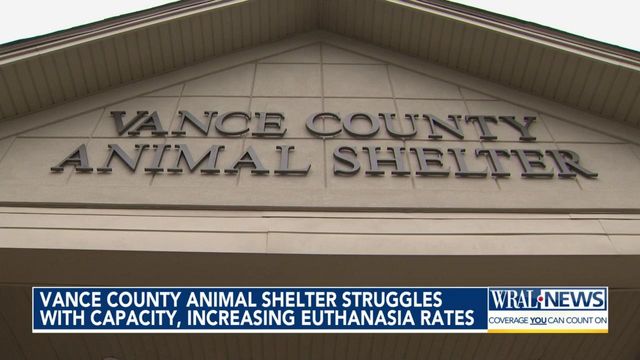Animal shelter in crisis: More dogs are being killed at rural NC shelters
Animal shelters across the country are facing a capacity crisis – too many dogs are coming in, and fewer are leaving.
North Carolina animal shelters had the second-highest euthanasia rate in the country in 2021. Vance County Animal Shelter is one of many North Carolina shelters seeing the same problem over and over again.
Euthanasia rates have increased at the shelter at 1243 Brodie Road in Henderson because there isn't enough space for all of the dogs coming in.
In 2023, the shelter saw its highest euthanasia rate in more than 12 years, taking in 590 dogs and euthanizing 34% of those dogs, up more than 200% from the previous year.
It's an alarming statistic the shelter is trying desperately to reverse.
William Coker, director of animal services at the Vance County Animal Shelter, said adoptions are down since COVID-19, and strays and surrenders are up.
"We've seen a surge in animals since COVID-19, and I think that's the biggest factor we're facing right now," Coker said.
The shelter is forced to euthanize more animals for space. The kennels are full, some with two dogs, which can create a stressful situations for animals and staff.
"High intake numbers is Vance County's biggest challenge," Coker said. "We've got 44 kennels."
The shelter is usually full, creating an issue when people surrender animals.
"Just a couple of weeks ago, on a Saturday, we had six dogs come through the front door," Coker said. "It puts you in a bind, it's stressful, what are you going to do with these animals."
Ruin Creek Animal Protection Society works with the Vance County Animal Shelter, helping to raise money and find homes for the dogs. On Facebook each week, it posts dogs on "death row" or those next up to be euthanized.
Ruin Creek is also starting a spay/neuter program and commits to a weekly "ride to freedom," where dogs scheduled to be euthanized are transported to out-of-state rescues that have space for them.
The freedom rides are critical, especially for pit bulls, which cannot be adopted out in Vance County.
"Everybody builds a bond with those animals," said Michelle Wood, who has worked with Ruin Creek for 10 years, including dogs on"death row" and the dogs that don't make it. "It hurts everyone when we lose an animal - [both] Ruin Creek and the shelter."
After COVID-19, animal rescue workers said some people are getting priced out of pet ownership. The cost of pet food, veterinarian care and even pet deposits for renters have increased.
Additionally, rescues aren't pulling dogs out of shelters like they used to – also due to increased costs.
"It was nothing to see 40 or 50 dogs leave on a Friday night and now it's like five or six dogs a week," Coker said.
Wood said it sometimes feels like progress is moving backwards.
"It was a lot of animals flowing in, the kill rate was high ... and now it feels like that's where we're going back," Wood said.
Not all dogs are euthanized for lack of space – others are put to sleep because they are injured or ill. When the decision comes to euthanize dogs, behavior is a factor.
"We always look at dogs that are aggressive first," Coker said. "That's our first priority."
While Ruin Creek Animal Protection Society is focused on getting animals out of the shelter, Coker is trying to keep from ever coming in.
"I want to educate the community and change the culture the way people look at animals," Coker said. "It's a commitment when you get this animal ... you have to take care of it. We have a county ordinance that says you got to do this."
That includes spaying and neutering animals, keeping pets leashed or indoors and treating pet surrenders as a last resort -- instead of bringing a pet to a shelter, try to find a new home yourself.
Backyard breeders are adding to the problem, as are the people who take them. Always adopt an animal from a rescue organization, if possible.
"The main thing to me is to change the way people look at this," Coker said. "This dog you take home is not disposable and they treat it like it is, they get tired of it or it keeps breaking its chain, they bring it here."
If nothing changes, Coker said the outlook is grim.
"We get no joy out of this," Coker said of euthanizing animals. "You come here and see what I have to see, any human being with a heart."














